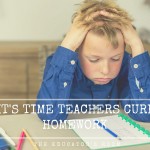This summer at my first PSEA Summer Leadership Conference (our union getaway in Gettysburg, PA), I heard what was probably the most interesting speech in years. The president of Student PSEA, a college senior about to begin her student-teaching that fall, talked about politics and education. She said that, while in high school leading up to the 2008 election, she hated politics. She couldn’t stand talking about them with people. She couldn’t attach herself to the untethered obstinacy. She decided on a future in education because it would be the furthest removed from politics. Now in 2012, she admitted there couldn’t be anything further from the truth- education and politics are interwoven like cookies and Christmas.
Despite this 22-year-old’s convictions, the average teacher abhors political fights. We enter this profession with a mind to change the future through the doorway of education, not through the wide crevice of legislation. We’d much rather be reading books on curriculum and classroom management than public policy; much rather talk to a parent than the local representative; much rather find a way to bridge common ground between a bullying situation than writing a divisive piece for the local newspaper. And we’d much rather take a week of R&R for winter break than even think of raising the red pen.
Teachers, by default are more prone to be filled with community ardor than political animosity. We spend our days giving 100% inside the classroom, doing our best to meet the demands from the community stakeholders: parents, principals, and, of course, students. This is in addition to the surfeit expectations we place upon ourselves. Our job is exhausting, and when we look at the school clock and see 5:00pm, the last thing we want to do is ‘put up our dukes’ any more than we already have. Besides, we have our own families to look out for, too!
However, the education family is under relentless attack and will be for some time. Take this picture about the perceptions of the profession. Our friends assume we just sit around and drink chocolate milk all day. Our parents think we’re esoteric Greek-speakers, correcting their grammar at every turn. Community members without children believe we sit in the faculty room all day, drinking coffee and dishing the news on Susie and Sam from our classrooms. Students often equate us with Severus Snape, but sometimes Voldemort. We trust we’re going to inspire the next genius while wishing the stack of papers to grade were paper mache instead.
But what’s missing from this conversation is what politicians think of us. Here’s what sits in many of their minds: we’re either having students help us make strike signs as part of an “art project,” answering questions at the end of the chapter in the textbook, or sitting on our computer, figuring out which movie theater accepts our 10% discount.
Here’s the scary part. These elected leaders who make major education policy decisions may be the most uneducated about our profession in public education. According to the Heritage Foundation, 37% of U.S. House Representatives and 45% of Senators send their children to private schools. Add to this list the President of the United States, and we start to see the decision makers who aren’t completely invested in the system we work so incredibly hard to not only sustain, but save. And here’s the issue, fellow teacher or concerned parent – we’re the only ones who can educate them.
And while many of the problems in education are linked to federally unfunded or underfunded mandates (think No Child Left Behind), there’s more to it than that. Take into account what your state legislature and governor are thinking about education. According to the Center on Budget and Policy Priorities, states spend 26% of their budgets on K-12 education, easily the highest of all expenses, and 13% on higher education. As we crawl from the Great Recession, everyone is thinking about how to save the democratic system, especially on the state level. With that, they’re coming after education dollars with expedience and we’ve let them.
While the debate over Social Security and Medicare, which represents 41% of the national expenditure, is a political non-starter in DC (known as the “Third Rail” of national politics), it couldn’t be further from the truth about the biggest state expenditure – education. There are many reasons for that, but chief among them is the notion that teachers are just too tired to put up a fight. The gloves remain off. Our tired faces wince at the word “fight.”
This winter break, I implore you to write to someone else also enjoying their winter break – your elected officials. Whether arming teachers in Texas or cutting them in California, each state’s education system seems to have its own impending political tug-of-war. Pennsylvania, my state, for example, will meet a New Year with a governor who will try to curtail – or eliminate – our pensions that were underfunded (and even unfunded some years) by the state legislature. So my colleagues and I plan on handwriting them a letter to educate them.
Our perspective has been absent or underrepresented in the political discourse for far too long. Participate in some cause for your students’ and your profession’s sake. The phone call or written letter can go a long way. If a 22-year-old who just finished student-teaching sees the value in it, everyone concerned about education hopefully will, too.





